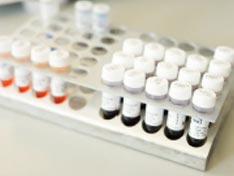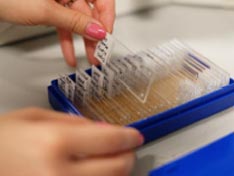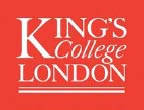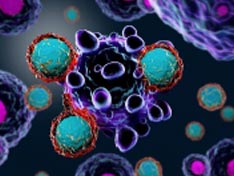Cell Culture Research at King’s College London – Project Update
INTRODUCTION
 The Chartwell Cancer Trust has been proud to support a Cell Culture Research Laboratory at King’s since its inception in 2018.
The Chartwell Cancer Trust has been proud to support a Cell Culture Research Laboratory at King’s since its inception in 2018.
With the long-term aim of developing therapies to support better patient diagnosis, care and treatment, the lab is already making huge advancements in understanding why people develop leukaemia.
Please click here to view a letter from King’s College Hospital to The Chartwell Cancer Trust.
 Understanding Haematological Disorders
Understanding Haematological Disorders
One of main lines of investigation in the lab is the study of ineffective erythropoiesis (i.e. deficient blood cell generation in our body). This dysfunction is a pathological feature of pre-leukemic disorders called myelodysplastic syndromes and Diamond-Blackfan anaemia. In cases of these diseases, the inherited mutations in the DNA disrupt the pathway that produces red blood cells causing the cells to die. This results in loss of production of red blood cells and subsequent anaemia (a lack of oxygen rich blood around the body). The blood system goes into overdrive trying to produce more and more red blood cells to alleviate the anaemia. If, these cells pick up more mutations, for example with age or through smoking, the overdrive then becomes uncontrollable turning into Leukaemia.
At the cutting-edge of Cell Culture Research
In studying ineffective erythropoiesis in haematological disease, it is important to work with and manipulate blood cells at all stages along the differentiation pathway.
In this work, cell lines are an invaluable research tool whereby patients’ cells are taken and modified genetically in order to propagate them indefinitely in the lab under controlled conditions. Gene-editing – a very recent technology that has taken the field by storm-can then be used to “surgically” intervene at any specific location in our DNA to dissect the genetic basis of disease.
This painstaking cell research and analysis is only made possible with very specialist equipment which has been procured through funding from The Chartwell Cancer Trust.
 Microbiological safety cabinet
Microbiological safety cabinet
In cell culture, the cells are grown under controlled and sterile conditions, outside their natural environment. After the cells of interest have been isolated from living tissue, they need to be maintained under carefully controlled conditions to ensure they do not become contaminated with microbes.
The two laminar-flow hoods (or biosafety cabinets) donated by The Chartwell Cancer Trust provide an aseptic work environment necessary for cell culture and experimentation, through the containment of infectious splashes or aerosols that can be generated by the environment.
ChemiDoc MP Imaging System
As molecular biologists, the team at King’s works with the tiny molecules of life, namely, DNA, RNA and proteins which cannot be seen directly. Visualisation of these molecules in experimental work using dyes and stains is critical to check whether manipulations of these molecules have been effective. To achieve this, The Chartwell Cancer Trust enabled the purchase of a brand-new Imaging System that allows the visualisation, quantitation and stored of images of the “stained”, or labelled, molecules of life as part of day-to-day experimental work.
This compact piece of apparatus, used in many modern laboratories, allows immediate visualisation of proteins and DNA and can instantly detect and analyse specific proteins and DNA in a sample prepared from tissue or cells. It is also more environmentally friendly as it does not use any harmful chemicals.
These pieces of state-of-the-art equipment are now integral parts of the laboratory and have enabled an exciting new phase of cell culture research at King’s.
Investing in infrastructure
Beyond the current research underway, the cutting-edge infrastructure within the laboratory has also been instrumental in securing funding for future work. Head of the Research Lab Professor John Strouboulis recently secured a two-year grant from Action Medical Research Trust as well as a Marie Curie EU Fellowship grant, amongst others, which not would have been possible without evidence of a high specification fully equipped facility already in place.
Impact in perpetuity
Funding for apparatus of this nature will bring cumulative impact over years of use. In addition to being used by a team of scientists, the equipment is also used for training clinicians and early career scientists – delivering huge benefits to scientific research long into the future.
Enabling enhancement together
To continue advancing their vital work with cell culture, the laboratory team recently approached the Trust about a next phase of funding to invest in further specialist apparatus.
The first piece of equipment is a Hypoxic Cell Culture Incubator which simulates the hypoxic (low oxygen) bone marrow environment where blood cells are generated and allows for manipulation of conditions to study red blood cell generation and dysfunction in pathologies such as sickle disease.
Additionally, a specialist tissue culture light microscope and camera will allow the team to record the cells’ images that they observe as part of their experiments. Both instruments will greatly enhance the functioning of the laboratory and the precision and efficacy of research methods and outcomes.
Based on the successes and impact of the laboratory to date, the Trust has been able to approve the request and award the funding needed for this further investment to go ahead.
“We are delighted to have been able to support this incredible research lab from its inception and to continue to do so. It is a such a critical field and we are so proud to be able to get behind it. This is our stake in the future so our children and grandchildren can get the benefit in years to come.”
Michael Douglas, Senior Trustee, The Chartwell Cancer Trust
“It is uncommon that research grants are awarded for the funding of equipment, despite this being such a critical resource. The Chartwell Cancer Trust has been a missing piece to the jigsaw puzzle and we are hugely appreciative of the ongoing support and investment that they have been able to make.”
Nikki Lee, KCL Development Team
“The support by the Chartwell Cancer Trust has been instrumental in setting up our new research lab and enabling us to carry out experimental procedures that are at the core of our research activities. The new donation will extend and further enhance the investment made by the Trust in the Cell Culture facility in our lab”.





